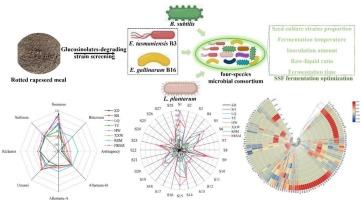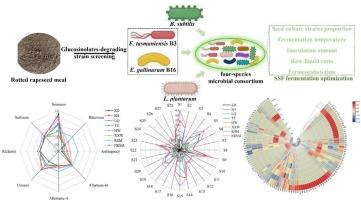A novel four-species microbial consortium for nutritional value improvement of rapeseed meal
IF 9.8
1区 农林科学
Q1 CHEMISTRY, APPLIED
引用次数: 0
Abstract
This study explores the potential of artificial microbial consortia to enhance rapeseed meal nutritional value. A novel four-species microbial consortium consisting of Bacillus subtilis, Lactobacillus plantarum and two screened glucosinolates-degradation strains Erwinia tasmaniensis and Enterococcus gallinarum was constructed for nutritional value improvement in rapeseed meal. Results demonstrated significant reductions in the concentrations of glucosinolates (86.08 %), phytic acid (59.41 %), 5-vinyl-1,3-oxazolidine-2-thione (94.40 %), tannins (73.88 %), and fiber (58.69 %). The crude protein and total amino acids concentrations were elevated by 0.46-fold and 1.22-fold higher compared to unfermented rapeseed meal. Comparative analysis revealed that fermented rapeseed meal exhibited superior crude protein digestibility, total amino acids content, and essential amino acids profile compared to six commercial products. Moreover, the fermentation of rapeseed meal significantly increased the abundance and concentration of volatile substances, thereby enhancing its sensory attributes. This research provides a promising strategy for the rapeseed meal valorization in feed industry.


提高菜籽粕营养价值的新型四种微生物组合
本研究探讨了人工微生物群落提高菜籽粕营养价值的潜力。构建了由枯草芽孢杆菌、植物乳杆菌和筛选出的两种硫代葡萄糖苷降解菌塔斯马尼亚欧文菌和鸡肠球菌组成的四种新型微生物群落,以提高菜籽粕的营养价值。结果表明,硫代葡萄糖苷(86.08 %)、植酸(59.41 %)、5-乙烯基-1,3-唑烷-2-硫酮(94.40 %)、单宁(73.88 %)和纤维(58.69 %)的浓度显著降低。粗蛋白质和总氨基酸浓度分别比未发酵的菜籽粕高0.46倍和1.22倍。对比分析表明,发酵菜籽粕的粗蛋白质消化率、总氨基酸含量和必需氨基酸谱均优于6种商品。此外,菜籽粕发酵显著提高了挥发性物质的丰度和浓度,从而增强了菜籽粕的感官属性。本研究为饲料工业中油菜籽粕的增值提供了一条有前景的策略。
本文章由计算机程序翻译,如有差异,请以英文原文为准。
求助全文
约1分钟内获得全文
求助全文
来源期刊

Food Chemistry
工程技术-食品科技
CiteScore
16.30
自引率
10.20%
发文量
3130
审稿时长
122 days
期刊介绍:
Food Chemistry publishes original research papers dealing with the advancement of the chemistry and biochemistry of foods or the analytical methods/ approach used. All papers should focus on the novelty of the research carried out.
 求助内容:
求助内容: 应助结果提醒方式:
应助结果提醒方式:


